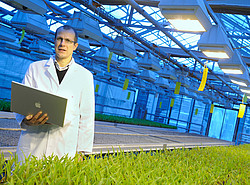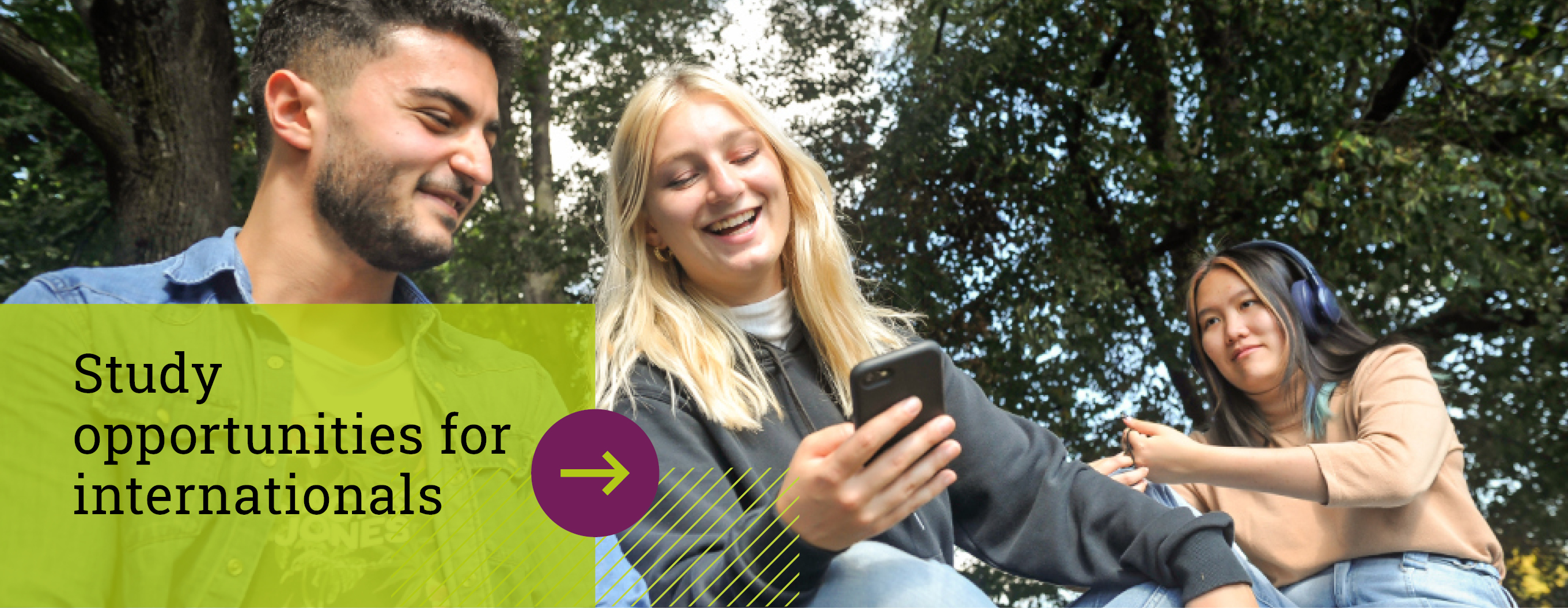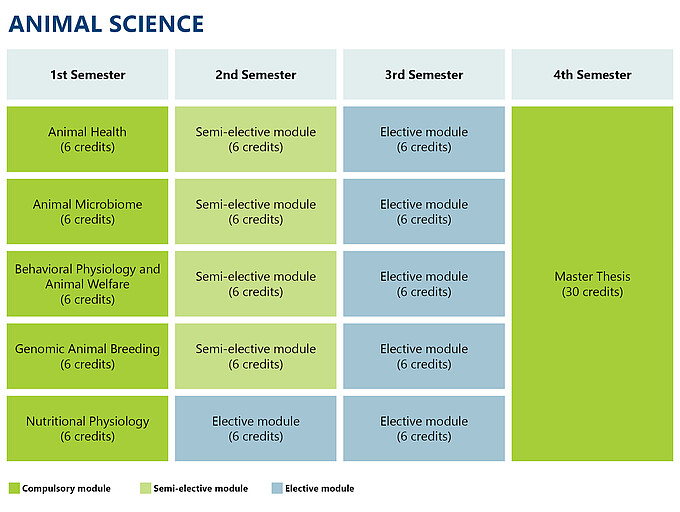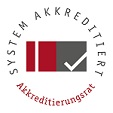Agricultural Sciences (Master’s)
Major: Animal Science
Focus on resource efficiency and animal welfare
Agricultural Sciences (Master’s)
Major: Animal Science
Focus on resource efficiency and animal welfare
The Animal Science major in the Master's program in Agricultural Science is just right for you if you are interested in the sustainable breeding, husbandry, nutrition, and health of farm animals and the production of high-quality animal-based food. Our range of courses is specially tailored to the requirements of the labor market and is oriented on current research topics. Our Institute of Animal Science focuses on resource-efficient, sustainable, and species-compliant husbandry of farm animals and uses a wide range of methods in teaching. This means that you’ll get a well-rounded education and be part of a dynamic research environment.
What you can expect:
- Self-selected specialization, e.g., on nutrition and feed, genomics and breeding, health and behavior.
- A particular focus of research at the institute is the microbiome of the digestive tract and the interaction between the animal microbiome and the environment
- Aspects of sustainability and ethical issues are dealt with intensively
- The social, economic, and environmental consequences of agricultural sciences are taken into account
- Reasons to Choose Hohenheim
| Degree Master of Science (M.Sc.) |
4 semesters 120 credits |
Language English |
University places Unlimited |
Location Stuttgart |
|||||
Sustainable animal husbandry and creation of animal products
The program is divided into three phases:
- The acquisition of basic professional and methodological qualifications through compulsory and semi-elective modules,
- The formation of a personal profile through a targeted selection of elective modules, research, and/or organizational internships, and
- The acquisition of scientific and in-depth professional skills by carrying out the Master's thesis.
The five compulsory modules on animal health, microbiome, behavioral physiology and animal welfare, genomics in animal breeding, and physiology of animal nutrition together comprise 30 ECTS credits. You can choose four semi-elective modules with a total of 30 ECTS credits from a wide range of animal science modules.
After that you can choose elective modules with a total of 30 ECTS credits from the entire range of diverse Master’s modules offered by the Faculty of Agricultural Sciences.
If you like, you can also use the third semester to study abroad. It is easy to have the modules you take during the semester abroad recognized.
You want to find out more?
Detailed information about the structure and sequence of the degree program can be downloaded here:
- Curriculum
- Module catalog
- Examination Regulations
- Admission Regulations (German | English)
- Institute of Animal Science
Video on the Animal Science major
Preparing scientific results for use by practitioners
The best way to practice the application of animal science knowledge is during an internship.
Gaining practical experience
You can integrate an internship, e.g., in an agricultural company or a company in an upstream or downstream sector, into the degree program via the elective portfolio module.
Expanding competences
You will find additional further education opportunities on campus in the form of the F.I.T continuing education courses, the “Artificial Intelligence and Data Science in Hohenheim” (AIDAHO) certificate, or the start-up support in the “Innovation Greenhouse”.
Learning from practice
The degree program offers you numerous opportunities for practical learning. Lectures by practitioners, projects with companies, exciting excursions, and application-oriented projects during your studies give you a direct insight into professional practice and promote your ability to actively apply the knowledge you have acquired.
Strengthen language and intercultural skills
Would you like to acquire further language skills? For this purpose, the Language Center at the University of Hohenheim offers various semester and intensive courses that you can take individually during your studies. You can even acquire the UniCert III C1 certificate as part of an elective module. During your studies, you will also acquire intercultural skills naturally by interacting with your fellow students from all over the world.
Research during your studies During your studies, you will have the opportunity to participate in scientific working groups and gain valuable insights into research practice. By actively participating in research projects, student research projects, and specialized research modules, you become part of the scientific process and acquire qualifications for independent scientific work.
Interesting and individual career prospects
The “Animal Science” major provides you with a well-rounded education for careers upstream and downstream in agriculture (crops and livestock), including a career in science.
The following career paths are open to you:
- Agricultural operations
- Companies in the livestock sector (feed, breeding, barn construction, biotechnology...)
- Food industry
- Agricultural administration and consulting, ministries
- Specialized journalism and public relations
- Associations
For those interested in science who complete their degree with an above-average overall grade, it is possible to continue into a doctoral program.
Students and Alumni
What makes our degree program so special?
- The Institute of Animal Science with eleven specialized departments provides a holistic and sound education in animal sciences with excellent and individualized supervision
- The Hohenheim Center for Livestock Microbiome Research
- The Agricultural Experiment Station
- You have a wide range of modules to choose from at the Hohenheim Faculty of Agricultural Sciences, which has more than 50 professors. This allows you to get a taste of other topics (e.g., business administration, organic farming) in addition to the courses you take in your individual specialization.
Good reasons to study at the Faculty of Agricultural Sciences in Hohenheim

Good reasons to study at the Faculty of Agricultural Sciences in Hohenheim
First Place not Once but Three Times: The current Global Universities Ranking from U.S. News & World Report, the renowned NTU ranking, QS World University Ranking, and dathe Center of World University Ranking put University of Hohenheim’s agricultural research in 1st place in Germany.
In the agricultural university ranking from top agrar, the agricultural students at the University of Hohenheim give the grades 1.5 to 2.0. According to the ranking 2016, 88% of the students surveyed would recommend the University of Hohenheim for agricultural studies.
The University of Hohenheim puts great importance on quality teaching, which is demonstrated by several award-winning reform projects.
These projects include for example mobile teaching (German e-learning innovation and young scientists award (d-elina) in the category “Campus” at the BITKOM) or the ethics module, developed by the student group FRESH and awarded by the UN.

You can choose from more than 200 modules offered by the Faculty of Agricultural Sciences. Upon request, you can even select from all of the Master’s modules offered by the University of Hohenheim and the other cooperating universities.

The vision of the Faculty of Agricultural Sciences is a global agricultural system which is productive, environmentally-friendly and socially-minded, and which is in harmony with society’s demand for a multi-purpose orientation.
Agricultural research at the University of Hohenheim is focused on four areas:
- Food for all: Security of global food supply
- Hazard prevention: Climate change and scarcity of resources
- Beyond fossil fuels: Bioenergy and bio-based value-creation networks
- Diversity instead of monoculture: Genome Diversity in Agriculture
There are no easy answers to these kinds of questions. That is why agricultural researchers at the University of Hohenheim work across disciplinary boundaries, collaborating with colleagues in the natural sciences, business administration and economics, and the social sciences, for instance in bioeconomics, a field of research and teaching that will become even more important in the future. That collaboration also has an impact on teaching.
Number 1 in internationalization: In the current EU ranking U-Multirank, the University of Hohenheim has a top spot in internationalization.
The basis for this placing is the decades-long, global commitment of the Agricultural Sciences. Especially our tropics research with 10 professorships has made the University known around the world.
International opportunities for students:
- 80 partner institutions worldwide (40 of which are in the Erasmus+ program)
- Member of the Euroleague for Life Sciences - the network for Europe’s best
- scholarship programs for travel, research, and exchange
- Worldwide alumni network
- Studies according to international standards for excellence and international competitiveness of graduates
Professors of the Faculty of Agricultural Sciences are in high demand.
The top experts include:
 | Chair of the scientific advisory council Prof. Dr. Martina Brockmeier The German Council of Science and Humanities is considered the highest-ranking advisory committee on topics of science in Germany. Its scientific members are appointed by the Federal President. |
 | In the Bioeconomy Council Prof. Dr. Regina Birner The Bioeconomy Council is an independent advisory committee for the German federal government. The goal: to establish a cross-sectoral and bio-based economy in Germany that uses as few fossil raw materials as possible. |
Further members in important commissions and expert lists
- Prof. Dr. Iris Lewandowski and Prof. Dr. Joachim Müller are members of the BMBF scientific advisory council "Agricultural Systems of the Future”
- Prof. Dr. Enno Bahrs is member of the BMEL scientific advisory council for biodiversity and genetic resources
- Expert lists on various agricultural topics

Scholarship and awards for studies, final theses, travel, and attending conferences: Thanks to many supporters, the University of Hohenheim has an unusually extensive scholarship culture.
Around 100,000 Euros is the total amount of all scholarships and awards that are presented each year at the Dies academicus.
More than 700 hectares of test area: Among German universities, the University of Hohenheim owns the largest amount of property. For students, this means a lot of room for their own experiments, research, and a great deal of hands-on experience.
Also directly on campus: State institutes for transferring science into practice, the Hohenheim Gardens, and the German Agricultural Museum.

The future lack of experts and managers in the area of agriculture / nutrition / horticulture means students of agricultural will have good career prospects. This was shown by a 2015 study by the Bundesverband Agrar Ernährung Umwelt (VDL).

The University of Hohenheim is a university with a long tradition. You will experience a truly unique university atmosphere enriched by the Baroque palace, the historic gardens and parks, and modern architecture: In 2009, the University of Hohenheim was declared the most beautiful campus university in the state.
In 2017, Hohenheim's President Stephan Dabbert was chosen by the German Association of University Professors and Lecturers (DHV) as the most popular president in Baden-Württemberg for the third year in a row. He was ranked second in all of Germany.
This jewel is located south of the state capital Stuttgart. Because it is close to Stuttgart, you have all the opportunities available in a big city. The University of Hohenheim is only a few minutes away from the airport, the Stuttgart Trade Fair Centre, and the autobahn and is easily reached with public transportation.
 | Unique party atmosphere: The historical Thomas-Müntzer-Scheuer, an old barn with a new purpose, is the party center of Hohenheim. |
 | The University ball in the pompous palace rooms is the social event of the year. |
| Application deadlines | |
|---|---|
| 1st subject-related semester | for the winter semester: for the summer semester (Germans, EU citizens): |
Higher subject-related semesters | Application to a higher semester is possible for the winter semester (application deadline: EU citizens: 15 September, non-EU citizens: 15 March) and summer semester (application deadline: All applications: 15 January). |
| Requirements | |
|---|---|
| Formal requirements | The Animal Science major in the Master of Agricultural Sciences program requires knowledge of agricultural and animal sciences in the depth taught in Bachelor's degree programs in agricultural sciences, agricultural biology, biology, or veterinary medicine. If you have completed one of these Bachelor’s degree programs, or a related degree program, you are in the right place.
|
| Content requirements | You should have the following interests and knowledge in addition to the formal criteria:
|
| Language skills |
|
| Pre-study internship | no |
| Selection procedure | |
|---|---|
| Selection criteria | None, the number of places is not limited However, an above-average average grade in the Bachelor’s program as well as a suitable previous degree program are admission requirements. |
| Selection interview | no |










